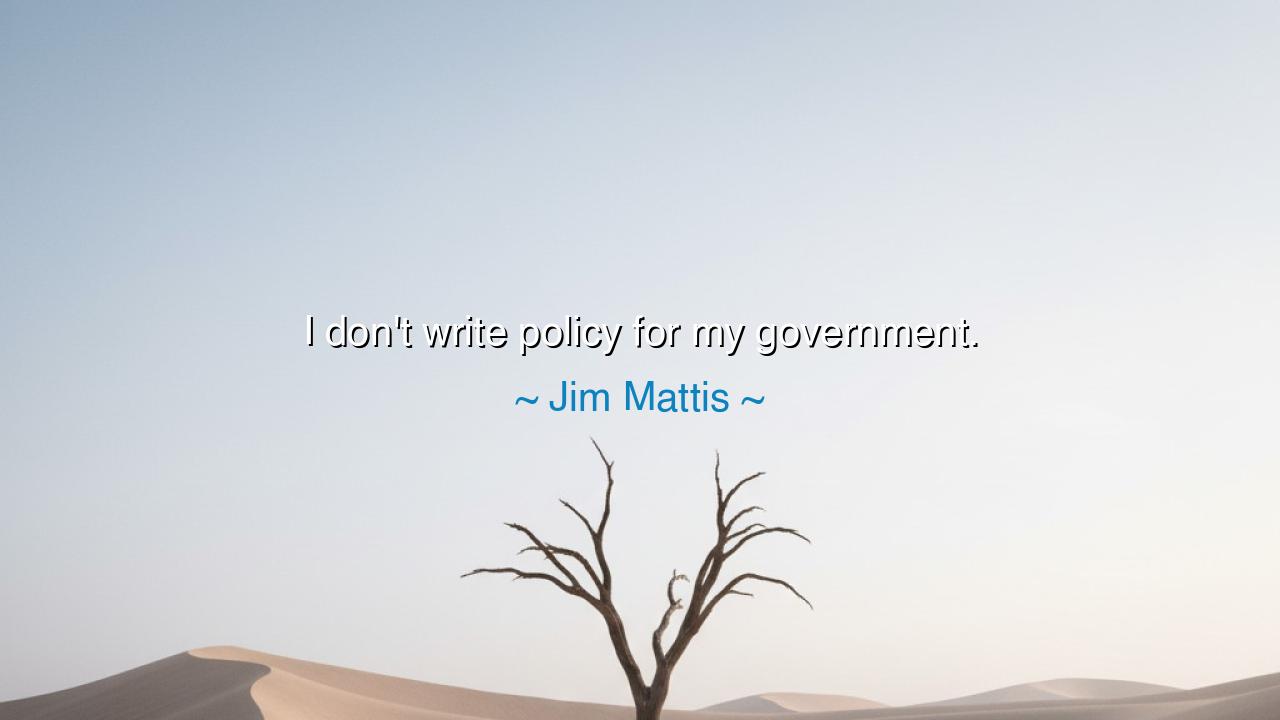
I don't write policy for my government.






In the disciplined calm of a soldier’s spirit, forged in the crucible of duty and sacrifice, Jim Mattis, the warrior-scholar and former U.S. Secretary of Defense, once spoke words that echo with humility and honor:
"I don’t write policy for my government."
Though simple, these words carry the weight of centuries — the understanding that in a just order, duty and authority must remain distinct, and that those who wield the sword must never presume to wield the scepter. For Mattis, a man of both intellect and discipline, this was not an evasion of responsibility, but a declaration of principle. He recognized the ancient truth that the strength of a republic lies in the obedience of the military to civilian command, and that the servant of the state must remain a guardian of its laws, not a maker of its decrees.
The meaning of Mattis’s statement is rooted in one of the oldest lessons of civilization: that power must be balanced by restraint, and service must be bound by loyalty to rightful authority. To say “I don’t write policy” is to acknowledge one’s place in the grand chain of command — to understand that in a free nation, soldiers fight not for themselves, but for the decisions of the people’s representatives. In this, Mattis’s words shine as a beacon of humility and wisdom in an age when pride too often disguises itself as leadership. He reminds us that the greatness of a warrior lies not in ambition, but in discipline, and that the mightiest sword is sheathed beneath the armor of obedience.
The origin of this idea lies deep in the history of republics and empires alike. In ancient Rome, the generals of the republic were bound by sacred duty to the Senate and the people. But when that duty was forgotten — when soldiers began to follow men instead of laws — the republic fell. The rise of Julius Caesar, once a servant of Rome and later its ruler, marked the beginning of the end for the republic’s freedom. His armies followed his will, not the voice of the people, and thus Rome’s democracy was swallowed by empire. It was to prevent such decay that America’s founders crafted a system where the military serves under civilian authority — a lesson that Mattis, steeped in history and service, carried like a sacred oath.
Throughout his long career, from the deserts of Iraq to the halls of Washington, General Mattis lived by this creed. Known as the “Warrior Monk,” he believed that the soldier’s first virtue is fidelity — not to power, but to principle. When he led Marines into battle, he did so not as a politician seeking glory, but as a servant of lawful command. When he later served as Secretary of Defense, he spoke truth to power, yet always within the bounds of respect and duty. His statement, “I don’t write policy for my government,” came as both a reminder and a warning: that those entrusted with arms must never mistake their strength for authority, and that the safeguard of liberty lies in obedience to lawful command, not personal will.
Yet his words also speak to something broader, something beyond the walls of government and the ranks of armies. They speak to the sacred harmony of society itself — that every person, no matter their station, has a role to fulfill within the greater order. The teacher, the craftsman, the healer, the judge — each must serve with excellence in their domain, but never presume to command all others. When individuals forget this order, when pride leads one to overstep their bounds, chaos follows. Thus, Mattis’s humility becomes a lesson for all: to lead, one must first learn to serve; to serve rightly, one must know one’s place.
Consider the story of George Washington, the great general who, after winning independence for his nation, laid down his sword rather than claim the throne. He could have ruled as a king, for his soldiers would have followed him unquestioningly — yet he chose instead to submit to the will of the people. Like Mattis, Washington understood that the soldier’s honor is bound to obedience, not ambition. His act of surrender was, in truth, his greatest victory, for it preserved the very liberty he had fought to create.
So let this teaching be remembered in every generation: authority is not greatness, and humility is not weakness. The measure of a just servant — whether soldier, citizen, or leader — lies in their ability to act with discipline, to fulfill their duty faithfully, and to respect the boundaries set by law and conscience. When each person honors their role, the nation stands strong; when pride drives one beyond their duty, freedom falters.
Thus ends the teaching: serve with courage, obey with integrity, and remember that the highest form of strength is self-restraint. For in knowing where your power ends, you preserve the freedom that binds all — the freedom for which countless men and women, like Jim Mattis, have given their service, their loyalty, and their lives.






AAdministratorAdministrator
Welcome, honored guests. Please leave a comment, we will respond soon